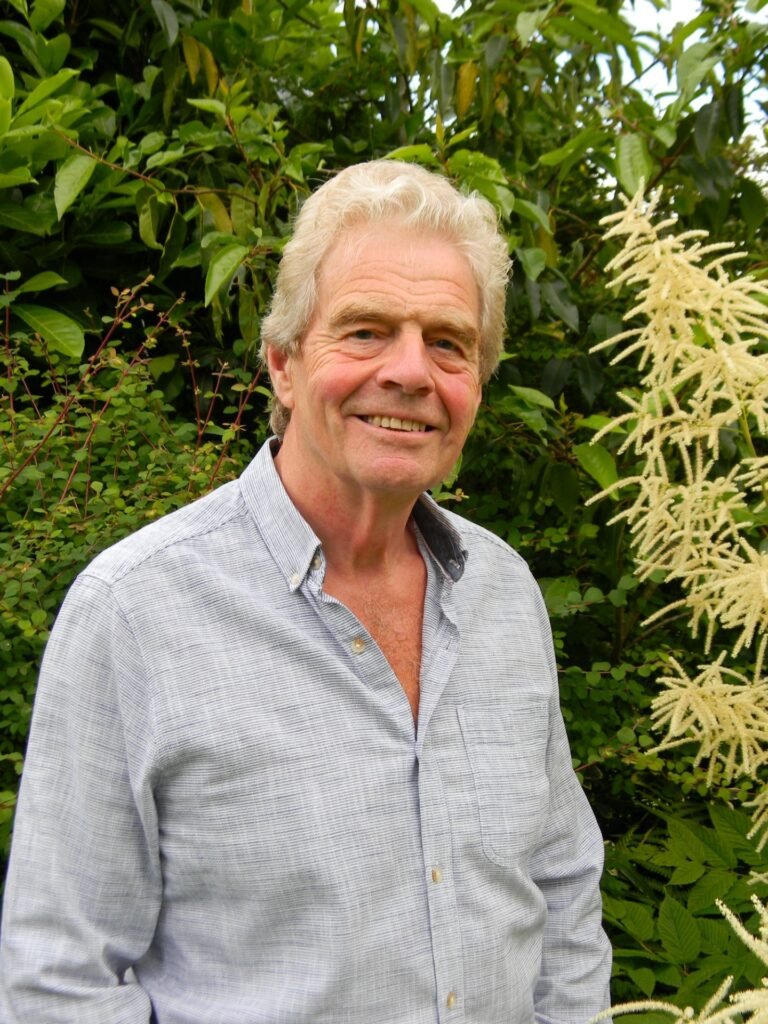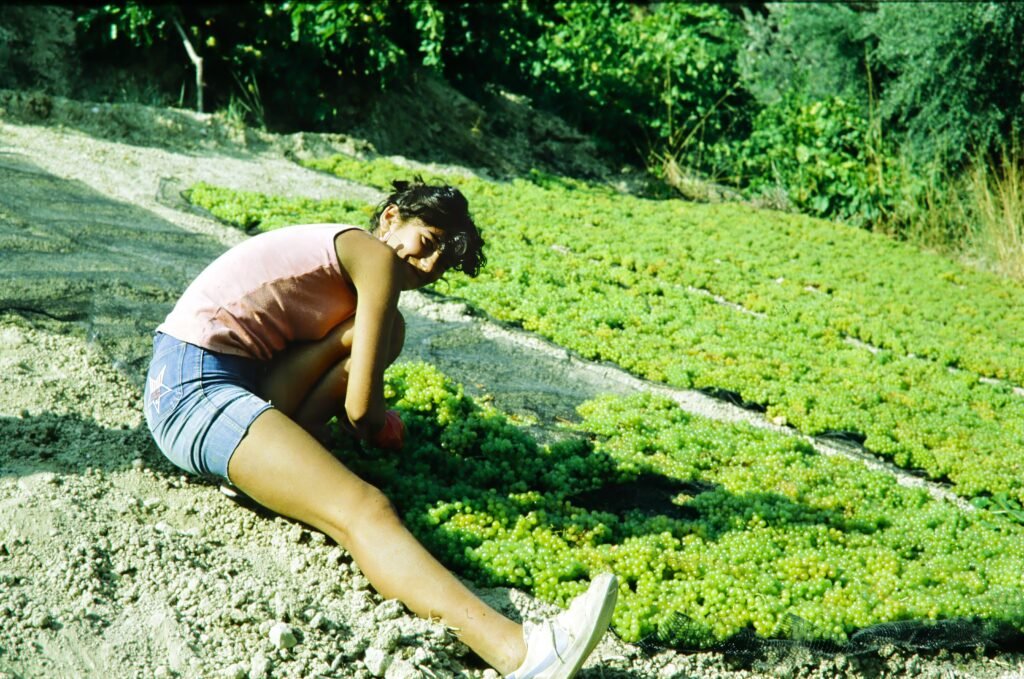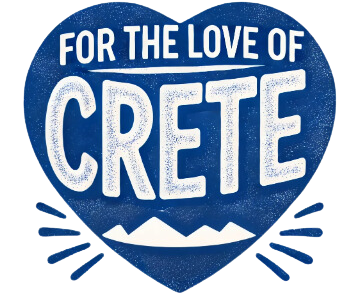Welcome to another exciting installment in our For the Love of Crete interview series! Today, I’m delighted to introduce you to Laurie Strange, author of the captivating novel “Lost in Crete.”
As fellow Crete enthusiasts know, there’s something magical about this island that captures the heart and imagination. Laurie’s novel beautifully weaves together Cretan history, culture, and landscape with compelling characters whose stories span generations. From the dramatic events of 1941 to the enduring connections that shape lives across decades, “Lost in Crete” invites readers to experience the island through a deeply personal lens.

Join me as I chat with Laurie about his journey writing this book, his family connections to Crete, and how a chance encounter with an “ageing, column-shift Renault” changed his life forever. Through our conversation, you’ll discover the passion and personal experiences that shaped his storytelling and the special relationship he’s developed with this extraordinary island.
- Your family ties to Crete must have influenced your writing. How has your relationship with the island evolved over the years, and what aspects of Cretan life inspired Lost in Crete?
You’re absolutely right, Bella. Without my Cretan family there would be no book. And it was the love and warmth experienced in being welcomed into a very special family that, in truth, lay at the heart of the story. Philoxenia — ‘the love of strangers’ — is legendary, but allowing one of your daughters to be carried off to England goes above and beyond!
What I also realised in those early years — my first visit to Crete was in 1979 — was that the widespread hospitality I encountered was partly due to the country of my birth. Being one of the Allied nations that attempted to help Crete resist invasion of their island, there remained a collective gratitude. At that time the war was still very much a living memory for many.
Helping with the family’s annual grape harvest one year, the day’s labours wore on, and I took to imagining what it must have been like for these soldiers and their proud hosts. And so the story began.

2. Crete’s landscapes are incredibly diverse, from rugged mountains to charming coastal towns. Which locations play significant roles in your story, and why did you choose them?
Walking the Samaria Gorge fuelled those early imaginations, knowing that as the island became overwhelmed by airborne invasion, the Allies had been forced to retreat across the mountains in hope of naval evacuation from the South.


While the book carries a backstory set against the events of 1941, with Souda Bay and Maleme airfield initially being the centre of activity, its main focus is not one of war, but rather, relationships — how these develop and are changed, both by time and events — and their consequences for future generations. Crete is indeed blessed with incredible scenic diversity. My familiarity with the inland villages and beaches surrounding Heraklion inevitably inspired many of the locations featured in the book, along with a truly memorable trip to the nearby island of Santorini.

3. The novel includes a storyline involving a Minoan artifact. How did that idea come about?
It stems from an early interest in ancient history, reading the Greek myths, as well as the novels of Mary Renault. Much of my early career was spent working in the theatre and it was quite some time before I went on a proper holiday — just in case the agent called!
When I finally took the plunge, it seemed natural to choose Crete and explore the palaces of Knossos and Phaistos, and of course the archaeological museum, where I was amazed at the beauty and craftsmanship of the Minoan period.
As I mentioned, the first inklings of a story began in one of the family’s vineyards. Still daydreaming, I speculated on what might lay buried beneath the Cretan soil for my protagonist to discover. A fabulous piece of Minoan jewellery perhaps — but then what — how to prolong the interest? That is when I settled on a single earring — one of a pair — but what of the other?

4. Your background in theater and directing must bring a unique perspective to writing. How did that experience influence the way you developed your characters and their interactions with Cretan locals?
I had already written two plays for children. One that brought the civilization of the Inca to life for them, and the other, that of the ancient Egyptians. I suppose weaving the Minoan civilization into this story came almost as second nature. But I think the greatest influence the theatre brings to any actor or director, is the discipline of observation. Equally indispensable is a keen ear for dialogue. I hope both ring true in my writing.
5. Oh yes, I can attest to this myself—your remarkable observation skills and natural dialogue truly bring your characters to life. How long did it take you to write Lost in Crete? What kind of research was involved?
Too long — forty-one years, to be exact! I began the first drafts in 1983 and haunted the Imperial War Museum in London for ages, viewing microfilms of the invasion and requesting copies of the London Gazette for operational details. At that time there was also a library in Wandsworth, which held a substantial collection of WWII material.
Spending summers with our children in Crete gave me not just the opportunity to catch up with relatives and their own new arrivals, but also to visit key sites for the story, as well as simply breathing in the everyday culture that shaped the quirks and characteristics of the cast that was forming in my mind. 1983 also saw the birth of the internet, which, much later, became another source of corroboration and enhancement to the original research.

6. What would you say was the most challenging part of writing Lost in Crete?
Without a doubt I would say life itself was the greatest challenge — it has a funny way of interrupting writing!
7. I couldn’t put down your book—it was quite a page-turner! Any chance we’ll see more books set in Crete in the future?
Thank you, I’m glad you enjoyed it. At the moment I’m working on a novel that reflects a period of my life spent running an antiques business dealing in the Arts and Crafts period, but I do miss my fictional Cretan family — it was always like meeting up with old friends every time I picked up a draft put by over the years! So, who knows? I may very well drop in and see what they have got up to!
8. It would be fascinating to see what your Cretan characters have been up to after spending so many years bringing them to life! I’m curious though—have you ever found yourself “lost” in Crete—either literally or metaphorically?
I have. Perhaps I should say it was rather a case of ‘Lost and Found’ and occurred on my very first visit. Having arranged for a rental car to be delivered to the small hotel I had booked for my first night in Heraklion, I planned to explore the island the following day.

Morning came, along with the prompt arrival of my car, delivered by a very attractive young lady whose charms went completely over my head, as she explained that, sadly, the vehicle I had ordered was not available, but in its stead she was positive I would not be disappointed with the ageing, column-shift, Renault she had negotiated to my door.
Time was at a premium, and left with little option but to comply, I set off on my explorations. All went well until the adventurer in me decided to go off-road. Taking what appeared to be a more interesting minor road, I enjoyed the unspoilt rural terrain until, swinging around a bend, I encountered a makeshift bridge across a small stream — essentially a concrete slab connecting both sides.
No time to brake. The nearside front wheel hit the side of the slab. Thankfully, the impetus of the old Renault carried me up and onto the slab. And crucially, the tyre had survived, or else I would truly have been up the creek without a paddle — no mobile phones in those days!
In due course I returned the vehicle to the young lady in her office. Little did I realise at the time that she would eventually become my wife!

9. What a beautiful twist of fate. Talk about a life-changing detour! Speaking of Cretan encounters—if you could have dinner with any Cretan historical figure, mythological character, or local legend, who would it be and why?
Certainly not the minotaur, or I would be on the menu. I suppose it has to be Ariadne. I can never untangle balls of string. Having recounted her tale, and still inconsolable over her abandonment by Theseus, Dionysos would turn up with the wine — quick toast — hasty exit!
10. Do you have a favorite Cretan dish?
Impossible question Bella! How to choose one from so many? A simple plate of olives, tomato, and cucumber, with your glass of raki is often as memorable as the most delicious pastitsio. But then what of the Easter lamb roasting away on the spit, washed down with the rosy, amber hues of last year’s wine? Spanakopita? Yemista? Dolmadakia? The list is endless. Just don’t leave me alone with a plate of kalitsounia!

11. You’re right, how can you choose? And now you’ve made me hungry! Beyond the delicious food, Crete has so many layers beyond its stunning landscapes. Are there particular traditions, local stories, or cultural elements in your novel that you hope will leave a lasting impression on readers? What do you hope they take away from the book—beyond just a great story?

To have been part of a traditional Cretan wedding — the entire village attending — is an unforgettable event. Life seldom rewards you with encounters that are unconditional — the love of a parent for their children being an obvious exception — but the closest you may get to a selfless generosity, warmth, and enduring friendship is often to be found within the boundless curiosity and open welcome of the Cretan people. My eldest daughter was adamant that her own wedding had be held on the island!
To write is to share, and I hope that Lost in Crete shares not just my own respect and gratitude, but the excitement of a proud and vibrant culture that is never more than a heartbeat away from the next dance.

—

What a pleasure it was to interview Laurie Strange! I’m struck by how his responses mirror the storytelling quality found in “Lost in Crete” – even in a simple interview, his natural gift for narrative shines through. The way he recounts his personal “lost and found” tale of meeting his future wife reveals the same keen observation and ear for detail that makes his characters come alive on the page.
Laurie’s deep connection to Crete – spanning over four decades – infuses both his writing and our conversation with authentic warmth and respect for the island’s culture. As he beautifully puts it, the “boundless curiosity and open welcome of the Cretan people” create an experience of “selfless generosity, warmth, and enduring friendship” that clearly continues to inspire him.

If you’ve been enchanted by this glimpse into Laurie’s relationship with Crete, I highly recommend picking up a copy of “Lost in Crete”. And if the story resonates with you as much as it did with me, please consider leaving a review on Amazon to help other readers discover this wonderful book.
My heartfelt thanks to Laurie for sharing his time and insights with us – this conversation has been as enriching as the Cretan hospitality he so lovingly describes. To learn more about Laurie and his work, be sure to visit his website.
Stay tuned for more interviews with fascinating people who share our love for Crete in the coming weeks!
Καλή ανάγνωση! Kalí anágnosi! (Happy reading!)
This post contains affiliate links, which means I may earn a commission if you click and make a purchase at no additional cost to you.
This interview was made possible with the support of the author, Laurie Strange. While this collaboration included financial support, my thoughts and recommendations are always 100% my own.


Thanks for an enlightening interview. Cretans, regardless of where they come from, become soulmates.
I have read the book, seemingly ages ago, but it was stolen, like a few others. And through amazon it will allegedly take 3 to 7 months to deliver…
Perhaps you can acquire a second-hand or antiquarian contingent and Leslie will surely support you in that.